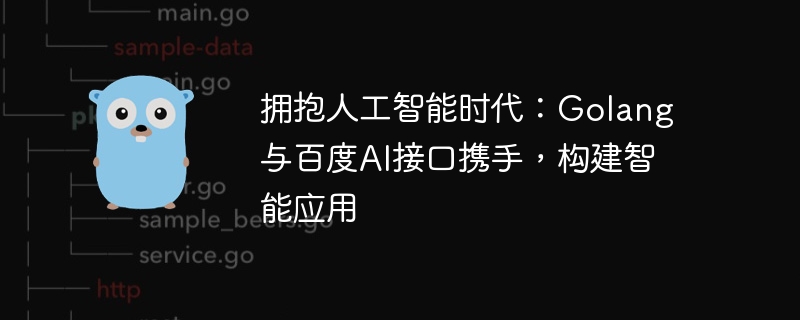

Embracing the era of artificial intelligence: Golang and Baidu AI interface join hands to build intelligent applications
With the rise of artificial intelligence, more and more companies and developers are beginning to Pay attention to how to apply artificial intelligence to your own products to provide more intelligent services. In this context, Golang, as a powerful programming language, is ideally combined with Baidu's AI interface, providing developers with a convenient and fast intelligent application construction solution.
Golang, as an efficient, concise and superior programming language with excellent concurrency performance, has been favored by developers in recent years because of its outstanding features. Baidu AI interface provides developers with a wealth of artificial intelligence services, such as speech recognition, image recognition, natural language processing, etc., and provides a convenient API interface.
Before we start, we need to apply for a Baidu AI developer account and obtain the corresponding API Key and Secret Key. Next, we will take image recognition as an example to introduce how to use Golang and Baidu AI interface to build an intelligent image recognition application.
First, we need to introduce the necessary libraries. Golang has a wealth of third-party libraries that can help us accomplish this task easily. We can use the go get command to install the Baidu AI Developer Toolkit.
go get -u github.com/Baidu-AIP/go-sdk/aip
Next, we can write code to implement the image recognition function. The following is a simple sample code:
package main import ( "fmt" "io/ioutil" "log" "github.com/Baidu-AIP/go-sdk/aip" ) func main() { // 设置百度AI的API Key和Secret Key client := aip.NewAipImageClassify("YOUR_API_KEY", "YOUR_SECRET_KEY") // 读取待识别的图片文件 img, err := ioutil.ReadFile("test.jpg") if err != nil { log.Fatalf("Failed to read image file: %v", err) } // 调用百度AI的图像识别接口,传入图片二进制数据 result, err := client.AdvancedGeneral(img, nil) if err != nil { log.Fatalf("Failed to call image classification API: %v", err) } // 解析返回的JSON结果,获取识别到的物体标签列表 labels := result["result"].([]interface{}) for _, label := range labels { fmt.Println(label.(map[string]interface{})["keyword"]) } }
In the code, we first create aclientobject of typeAipImageClassify, and then passioutil.ReadFileRead the image file to be recognized and convert it into binary data. Next, we call Baidu AI'sAdvancedGeneralmethod to pass the image data to the API interface. Finally, we parse the returned JSON result, obtain the recognized object label list, and output it to the console.
Through this simple example, we can see that the combination of Golang and Baidu AI interface is very simple and efficient. Developers can build a variety of smart applications with just a few lines of code, providing users with more convenient and smart services. Of course, this is just one example. Developers can use Golang and Baidu AI interfaces to build more complex and personalized intelligent applications according to their own needs.
In general, the combination of Golang and Baidu AI interface provides developers with a powerful intelligent application construction platform. Through this combination, developers can give full play to the excellent features of Golang and the rich functions of Baidu AI interface to build smarter and more efficient applications. In the era of artificial intelligence, we should embrace the development of technology and actively use tools such as Golang and Baidu AI interface to create more beneficial intelligent applications for society.
The above is the detailed content of Embracing the era of artificial intelligence: Golang and Baidu AI interface join hands to build intelligent applications. For more information, please follow other related articles on the PHP Chinese website!
 How to define variables in golang
How to define variables in golang What are the data conversion methods in golang?
What are the data conversion methods in golang? What are the commonly used libraries in golang?
What are the commonly used libraries in golang? What is the difference between golang and python
What is the difference between golang and python Introduction to python higher-order functions
Introduction to python higher-order functions Functions of tracert command
Functions of tracert command Which platform does Tonglian Payment belong to?
Which platform does Tonglian Payment belong to? What are the mobile operating systems?
What are the mobile operating systems?



